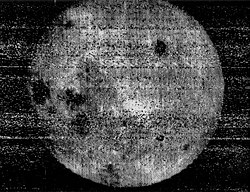User:Emijrp/Wikipedia to the Moon

- This page reflects Emijrp's views on Wikipedia to the Moon.
The Wikipedia to the Moon project is a good opportunity to discuss relevant topics like knowledge, digital preservation, storage media lifespan, content notability, biases and mirrors.
General thoughts[edit]
- Wikipedia to the Moon would be the first Wikipedia backup beyond Earth. Moreover, it would be the first written work preserved in the outer space. The closest examples are Voyager Golden Record (small storage, long lifespan) and some interstellar radio messages (small storage, long lifespan).
- There is only limited data space available for the mission, about 20GB, opening a debate about what knowledge is more important to include. Obviously, that depends on the disc purpose.
- Knowledge capsule: If we want to preserve the most important knowledge in human history, we should include concepts, events, biographies and works of high impact.
- Language understanding: If we want to maximize the chances to read other works, we could produce an artificial Rosetta Stone, translating the same text to many languages. The currently used languages will get older in the next centuries, the same that Old English is now old or become extinct like many others.
- All human knowledge map: If we want to help future archaeologists and other scientists to find places full of knowledge, we could include the coordinates of all museums, notable buildings and cities worldwide.
- Encyclopedia Galactica: All of above.
- Wikipedia articles reflect a late modern period bias, as every work in any era of human history, that is the cultural hegemony shaped by the dominant ideology.
- The disc in the rover could be just the Volume I of a much vast encyclopedia, solving the limited data space issue. Other discs could be launched in the future or saved in other locations like national libraries in five continents. The locations should be included in the Volume I.
Disc content[edit]
This is a partial list of content that I think it would be useful to include:
- Cover
- How to read this disc
- Greetings in 280 languages
- Prologue
- Wikipedia basic principles and guidelines
- All countries, subarticles and lists
- All cities and municipalities
- All species
- Scientific laws
- Our knowledge about the Universe
- All museums, libraries and archives (actual or digital)
- All books, films and works of art
- All human languages and writing systems, artificial codes, animal languages, programming languages and digital formats
- Index of time capsules. Voyager Golden Record and interstellar radio message contents.
- Index of web archiving initiatives
- Unsolved problems
- Predictions
- Other wikis and deleted Wikipedia content (summary about these communities)
- Summary (only the lead?) of other articles
- Index of all articles
- Next encyclopedia volumes and their locations
- License and credits
Some images, audio and maybe low resolution video. Some works from Wikisource, glossaries from Wiktionary, etc.
Community info like talk pages, history and meetups.
Scenarios[edit]
- The rover launch fails and never reaches the Moon. We could try again in the future. I think that a version to download and run in our computers is desirable.
- The rover reaches the Moon
- ... but it is never found. It could get lost in a crater or under the Moon dust; it depends on its size, shape and color. Also, it could be hit by an asteroid before being recovered.
- ... and it is found by humans. It could be turned into an open-air museum, a UNESCO MHS (Moon Heritage Site) but also damaged by vandalism or stolen.
- ... in 50 years
- ... in 100 years
- ... in 1000 years
- ... in 1000000 years
- ... and it is found by aliens
Other ideas[edit]
- The rover must drive 500 meters, so it could write a message in the regolith (lunar soil). A big "README" wheel track.
